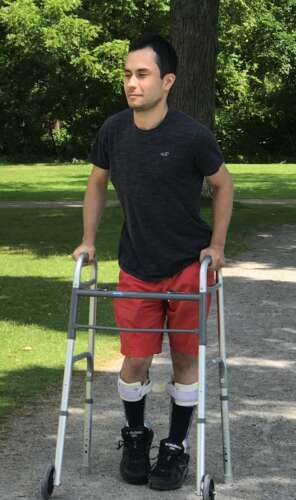Ten years after sustaining an injury that left him incapacitated, Juan Torres will cross the convocation stage at the University of Guelph, a feat doctors once told his family would be impossible.
It remains unclear what caused Torres to lose all ability to move his body or communicate. He chooses not to focus on what happened to him and instead on how he has overcome it. “I’m a completely different person than I was then,” he said.
And he is.
On June 16, Torres, now 29, will graduate with a bachelor of commerce from the Gordon S. Lang School of Business and Economics and just like scores of new graduates, will enter the job market.
“I want to go into finance. I recently found that I need some more certifications,” he said, explaining his intention to become a chartered professional accountant. “That’s what my end goal is. I have the drive to achieve all that I want in life.”
Defying medical opinion

In July 2013, Torres spent a typical summer evening with a friend, returned home and headed to bed. In the morning, his mother Margarita Perez heard him choking in his bedroom and found him unresponsive. Torres went into what doctors call a “vegetative state” where responsiveness and awareness are absent. Or so they thought.
When he was able to verbally communicate less than a year later, Torres stunned doctors telling them he remembered everything he experienced while incapacitated, describing it as feeling trapped inside his own body.
Doctors say he defied medical opinion; many had told the family Torres would never be able to walk, talk or live independently again. The type of brain injury he sustained affected, among other things, his memory, attention and vision – skills integral to the pursuit of education.
But Torres wasn’t ready to give up. He knew what others didn’t. And so, he pushed himself.
He began walking, taking small steps with mobility aids – though he now navigates the world in a wheelchair for efficiency and safety – saw a speech therapist to regain cognitive functions and in 2015 enrolled in a semester at Sheridan College. Prior to his injury, Torres had plans to study life sciences at the University of Toronto. That drive to pursue his education never left and he was eager to return to the classroom.
‘Keep at it’
Torres began at U of G in 2016, his parents driving him every day from Oakville. Now living independently (though he very much misses the family dogs at home), he moved into his own place in Milton last fall and commuted by bus. “It’s always been so great,” he said of his time at Guelph. “All the people here were so helpful.”
Perez admires her son. “His strength has inspired me always. He has never given up. We have witnessed him in university with all the challenges. I am very proud of him for that.”
“The more that he challenges himself, the more his brain is finding a way,” she added.
Torres does not want what happened to him to define who he is.
He is less interested in talking about what lies behind him, solely focused on the path ahead, one he fought tirelessly to return to. When he crosses the convocation stage, he said he’ll be thinking what every other graduate likely is: “Finally! It’s about time.”
His advice for those yet to reach that goal like he has? “Keep at it,” he encouraged. “Because it will pay off in the end.”
